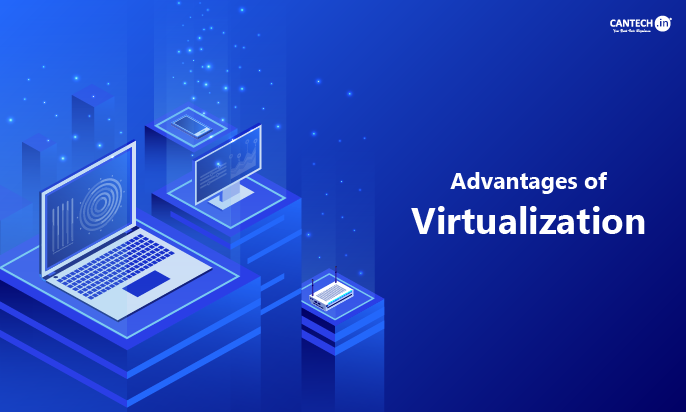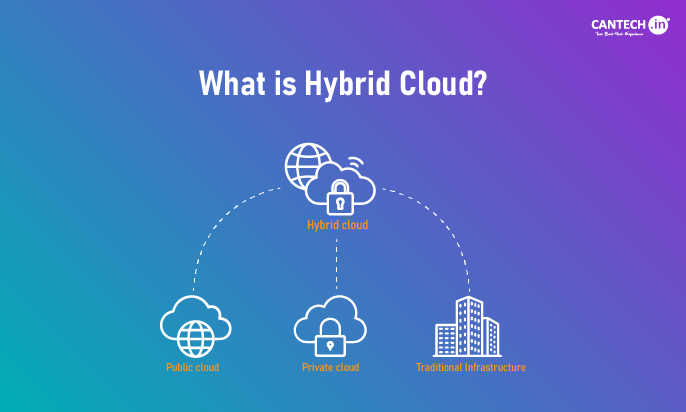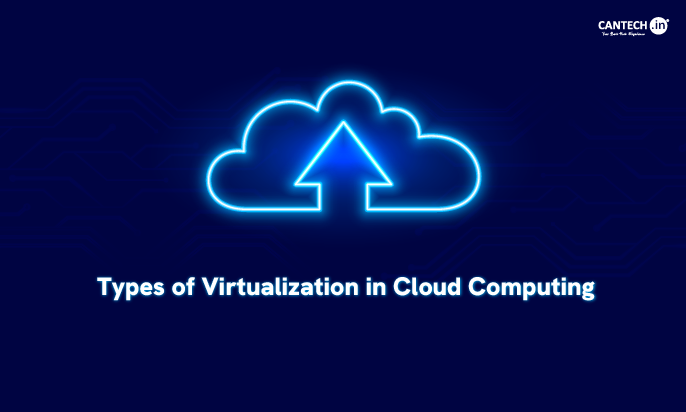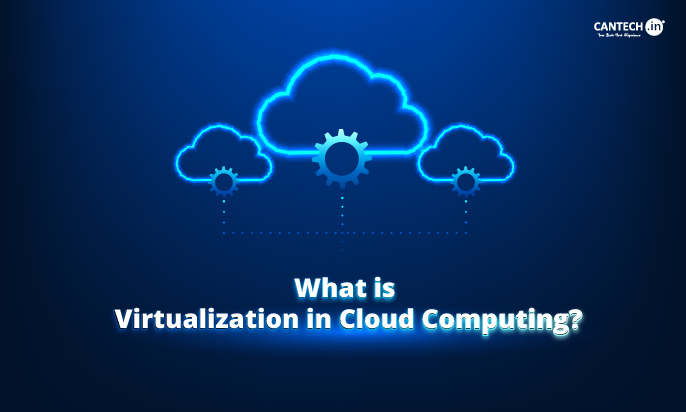Introduction
Businesses always want new ways to optimize resources and cut costs. Virtualization offers various benefits in this regard. It also greatly enhances performance.
Well, Virtualization is a powerful technology that is changing the way devices and servers work. You need not use many physical machines as it can create virtual ones on a single system. It makes everything flexible and easy to manage in terms of cloud computing, data storage, or security.
Let’s learn more about the advantages of virtualization and its benefits in cloud computing. Before that, we will discuss its basics.
What is Virtualization?
Virtualization means to create virtual machines on physical devices such as servers, storage, or networks. Thus, one powerful machine is divided into multiple smaller virtual machines. They all work in isolation independently. Also, each of them runs its own operating system and applications.
Thus, businesses can run everything from one system and use their resources in a better way.
They need not buy separate servers for different tasks that use only a small part of their full power and sit idle otherwise. This further caused the wastage of money and resources. Virtualization rectified these issues and solved this problem. It enabled efficient use of hardware. So, you get better performance and lower costs.
How Virtualization Works?
Virtualization uses the software called a hypervisor for its efficient working. It controls and manages the virtual machines. It is between the physical machine and the virtual machines to make sure that each virtual machine is allocated processing power, memory, and storage in the right and optimized manner.
Each virtual machine functions independently and runs a different operating system using a hypervisor. Therefore, you can run Windows, Linux, and other operating systems at the same time on a single server.
There are two types of hypervisors. Type 1 Hypervisors run directly on the hardware and do not need an operating system. VMware ESXi and Microsoft Hyper-V are two examples. Type 2 Hypervisors run on top of an operating system and are not as fast as Type 1. Examples include Oracle VirtualBox and VMware Workstation.
Types of Virtualization
Below are some common types of virtualization –
1. Server Virtualization
Multiple virtual servers can run on a single physical server so you can have different applications running without extra hardware requirement.
2. Storage Virtualization
This is to make different storage devices work in one system. Therefore, you can access all data from one place instead of multiple storage units.
3. Network Virtualization
Different virtual networks can run on one physical network. This is great for security and flexibility.
4. Desktop Virtualization
Using this type, you can access your desktop and applications from anywhere. Thus, it enables easy management of systems.
5. Application Virtualization
Application virtualization is to run applications in a virtual environment. So, you can use software without installing it on the local machine.
Now that we know the basics, let us move forward and discuss the benefits of virtualization and its importance in cloud computing.
Want a deeper dive into how virtualization powers cloud computing? Read our detailed guide on Different Types of Virtualization in Cloud Computing to learn more!
What Are the Advantages of Virtualization?
Due to some of the major benefits of virtualization as mentioned below, it is popular for all types and sizes of businesses –
Cost Efficiency
Virtualization consolidates physical servers into fewer machines. This enables cost savings because businesses can save on various aspects including hardware and space.
Also, fewer physical devices mean decreased power and cooling requirements. All in all, it comes down to lower overall infrastructure expenses.
Optimized Resource Usage
Businesses can maximize their hardware’s potential by optimizing the use of resources. There will be no more underutilized servers sitting idle because virtualization runs multiple virtual machines on a single server. Therefore, the server resources are fully utilized.
Easy Management
Virtualized system management is much less complex and highly efficient. It is far easier than the management of multiple physical servers. Also, you have centralized management to easily configure, monitor, and maintain your infrastructure. All this is mainly helpful in large organizations.
Disaster Recovery
Virtual machines are stored as files so they can be backed up easily. Also, recovering from a disaster like in case of a system failure is much quicker here. This kind of backup flexibility helps your business get back online quickly after unexpected events.
Scalability and Flexibility
You can scale your virtualized servers quickly and flexibly. Thus, it is easy to meet your business growth or demands because you can easily deploy more virtual machines without more physical hardware.
This is true in any case i.e. to scale up or down, you can adjust your infrastructure any way with the availability of resources.
Better Security
Virtualization gives the benefit of isolation so each virtual machine works independently from others with an added extra layer of protection. Therefore, any compromise in one does not affect others.
Due to this, multi-tenant environments (multiple users sharing the same physical resources) can function securely. It adds an extra layer of protection that traditional systems often lack.
Challenges of Virtualization
Virtualization has some challenges too –
- Performance Issues – Due to shared physical resources, performance may degrade if too many virtual machines run on one server.
- Security Risks – In case of any security breach to the hypervisor, the hackers may access all virtual machines. So, you must have strong security measures.
- Complex Setup – The setup of a virtualized environment requires technical skills. Thus, it is difficult for small businesses without expert help.
- Software Licensing – Some software applications need you to have separate licenses for different virtual machines and this can increase costs.
Virtualization in Cloud Computing
Cloud providers create virtual machines using virtualization to manage resources. This way, cloud computing and virtualization work together.
Thus, cloud services like Google Drive, Dropbox, and Amazon Web Services work with virtualization and offer flexible and scalable services.
Let us review more benefits of virtualization in cloud computing –
Advantages of Virtualization in Cloud Computing
Efficient Resource Management
An elastic pool of resources is created by virtualizing computing power, storage, and networking. So, there are no physical limitations and you can access and manage them as needed. Also, through this model, you can easily scale your usage up or down with no downtime or performance issues.
Flexibility in Service Deployment
You can use a virtualized cloud environment for various types of services. You can host websites or applications, use them for data storage, etc. in a more flexible manner. Also, you can access different types of services anytime.
Moreover, it becomes easy to allocate resources in real time and even use different configurations for different needs.
Performance and Speed
Optimized virtual machines make the cloud more efficient. Resources are allocated dynamically based on demand so the cloud can adapt quickly to any sudden changes in workload. Thus, they can run workloads with greater speed and performance.
So, this is the best setup if you need high-performance computing without any additional investment in extensive hardware.
Cost-Effective Cloud Solutions
Businesses pay only for the resources they use, they need not maintain an on-premises data centre with its associated costs. Also, they do not need to invest upfront in expensive hardware with this ‘pay-as-you-go’ model.
Faster Provisioning of Services
Virtualization in the cloud enables rapid deployment of services. The cloud provider can quickly provide additional virtual machines to meet your sudden increased needs. Moreover, there are no long delays or new hardware installations required.
Better Disaster Recovery in the Cloud
It can also boost cloud-based recovery like physical system recovery. Virtual machines are easy to replicate and back up. Using the same, cloud providers safeguard clients’ data.
Moreover, the virtual machine can also be restored almost instantly so there would be minimal disruption in case of any disaster.
Other Benefits of Virtualization
- High Availability – With multiple virtual machines functioning, if one fails another takes over immediately.
- Automatic Updates – Users always have access to the latest features and security fixes with regular software updates.
- Flexible Storage – Store and access data from anywhere.
Future of Virtualization
With new technologies, virtualization is becoming more powerful. They make virtualization useful in various ways for businesses. Some of them with their benefits are mentioned below –
- Containers and Microservices – Containers like Docker provide lightweight virtualization. They are used for faster application deployment and management.
- Artificial Intelligence (AI) Integration – AI is helping in various ways; mainly for better resource management. It predicts and automatically adjusts resource allocation.
- Edge Computing – It processes data faster without relying on distant data centres.
- Hybrid Cloud Solutions – Virtualization helps in managing hybrid cloud environments efficiently so that you can use both private and public clouds together.
Conclusion
The advantages of virtualization help your business with efficient operation of various types of solutions. You can save costs and implement cloud computing without any hassles. Also, security and data management are paramount with this technology. All in all, understanding and using virtualization can help in building a smarter future for your business.
Get in touch with Cantech for our affordable VPS hosting services for your applications and websites. We use the most advanced technology and provide comprehensive solutions with top-notch security!
FAQs
What are the security benefits of using virtualization?
Virtualization provides strong security through isolation. Each virtual machine works independently so if one gets hacked the others still stay safe. Also, with an added layer of extra security, threats are stopped from spreading.
How does virtualization improve business efficiency?
Business operations become more efficient as many virtual machines run on one physical server. Thus, it enables optimized resource usage and cost efficiency by cutting down on extra hardware. Moreover, you can easily scale up or down without adding more hardware.
Does virtualization help reduce operational costs?
Yes, virtualization reduces costs by decreasing the need for physical servers. It lowers hardware, electricity, and maintenance expenses. Well, it also ensures better use of resources and that is cost-efficient in the long run.







